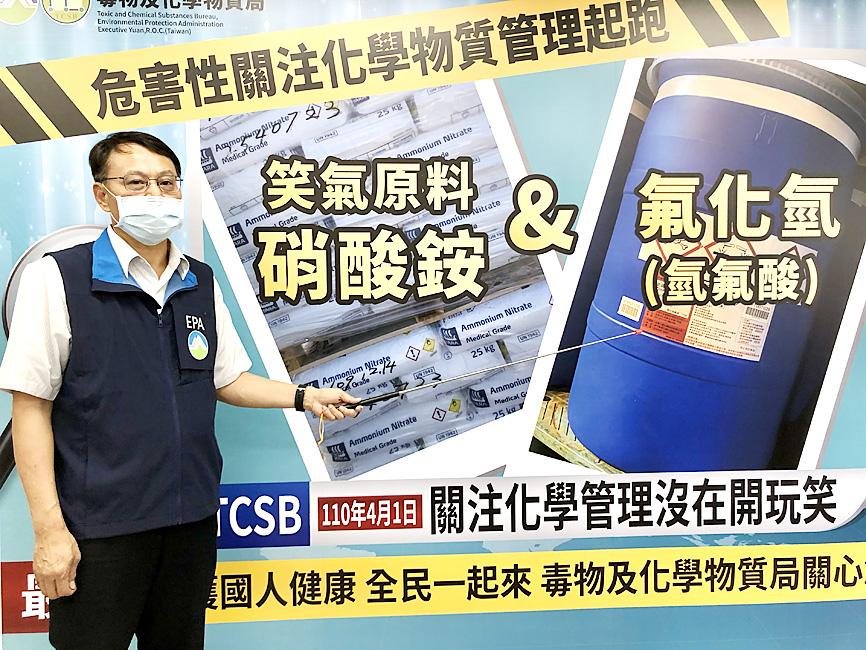Explosive substances such as ammonium nitrate and hydrofluoric acid would be restricted from imports, manufacturing, usage, storage, transportation and sale in Taiwan, the Environmental Protection Administration (EPA) said yesterday.
The agency issued a preview of planned amendments to regulations that are to take effect on July 1.
Hydrofluoric acid, which emerges when hydrogen fluoride is dissolved in water, has caused many injuries in industrial accidents and has been used to maliciously harm people, and should be regulated, Toxic and Chemical Substance Bureau Director-General Hsieh Yein-rui (謝燕儒) said.

Photo: Lo Chi, Taipei Times
An ammonium nitrate explosion in Beirut last year caused at least 210 deaths and 7,500 injuries, Hsieh said, adding that the substance should be regulated.
Ammonium nitrate is also used to produce helium, the first chemical restricted by the EPA, Hsieh said.
The online sale of the substances would be banned, as well as their unlicensed transportation, storage or sale, he said.
The regulations would also require detailed labeling, monthly reports and other measures, Hsieh said.
Contingency measures and other standards would be enforced at factories that handle more than 50,000kg of 80 percent pure ammonium nitrate, and 300kg of solutions with more than 10 percent hydrofluoric acid, he said.
The regulations would stipulate fines of NT$30,000 to NT$300,000 (US$1,051 to US$10,514) for breaches when transporting the substances, Hsieh said.
Contraventions of accident-prevention mesaures would result in fines of NT$30,000 to NT$500,000, he said.
Accidents involving the substances leading to fatalities or injury would be punished with 7 years to life in prison and fines of up to NT$10 million, Hsieh said.
Facilities handling the substances without having insurance or without protective equipment would be fined NT$1 million to NT$5 million, he said.
The EPA had also found that some aluminum cleaning products sold in Taiwan contained hydrofluoric acid, he said.
The agency has asked manufacturers to add warnings to their labeling that inform customers of measures in case of an accident, Hsieh said.

US climber Alex Honnold is to attempt to scale Taipei 101 without a rope and harness in a live Netflix special on Jan. 24, the streaming platform announced on Wednesday. Accounting for the time difference, the two-hour broadcast of Honnold’s climb, called Skyscraper Live, is to air on Jan. 23 in the US, Netflix said in a statement. Honnold, 40, was the first person ever to free solo climb the 900m El Capitan rock formation in Yosemite National Park — a feat that was recorded and later made into the 2018 documentary film Free Solo. Netflix previewed Skyscraper Live in October, after videos

NUMBERS IMBALANCE: More than 4 million Taiwanese have visited China this year, while only about half a million Chinese have visited here Beijing has yet to respond to Taiwan’s requests for negotiation over matters related to the recovery of cross-strait tourism, the Tourism Administration said yesterday. Taiwan’s tourism authority issued the statement after Chinese-language daily the China Times reported yesterday that the government’s policy of banning group tours to China does not stop Taiwanese from visiting the country. As of October, more than 4.2 million had traveled to China this year, exceeding last year. Beijing estimated the number of Taiwanese tourists in China could reach 4.5 million this year. By contrast, only 500,000 Chinese tourists are expected in Taiwan, the report said. The report

Temperatures are forecast to drop steadily as a continental cold air mass moves across Taiwan, with some areas also likely to see heavy rainfall, the Central Weather Administration (CWA) said. From today through early tomorrow, a cold air mass would keep temperatures low across central and northern Taiwan, and the eastern half of Taiwan proper, with isolated brief showers forecast along Keelung’s north coast, Taipei and New Taipei City’s mountainous areas and eastern Taiwan, it said. Lows of 11°C to 15°C are forecast in central and northern Taiwan, Yilan County, and the outlying Kinmen and Lienchiang (Matsu) counties, and 14°C to 17°C

STEERING FAILURE: The first boat of its class is experiencing teething issues as it readies for acceptance by the navy, according to a recent story about rudder failure The Hai Kun (海鯤), the nation’s first locally built submarine, allegedly suffered a total failure of stern hydraulic systems during the second round of sea acceptance trials on June 26, and sailors were forced to manually operate the X-rudder to turn the submarine and return to port, news Web site Mirror Daily reported yesterday. The report said that tugboats following the Hai Kun assisted the submarine in avoiding collisions with other ships due to the X-rudder malfunctioning. At the time of the report, the submarine had completed its trials and was scheduled to begin diving and surfacing tests in shallow areas. The X-rudder,